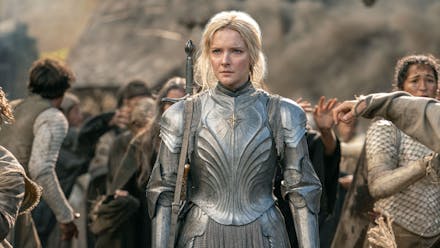Episodes viewed: 2 of 8
Streaming on: Prime Video
J.R.R. Tolkien was an Oxford professor of Anglo-Saxon and a philologist and, by most accounts, a quiet, unassuming man. He also basically created the high-fantasy genre we know today. Without his Lord Of The Rings, there’s no Game Of Thrones or Wheel Of Time or The Witcher: no TV fantasy boom of the kind we’re seeing right now. So a new TV adaptation, even one based on the appendices of his great epic, is exciting; what’s even more thrilling is that the first two episodes of this show suggest that it’s worthy of the name.

Brilliantly, new showrunners J. D. Payne and Patrick McKay have set their tale several thousand years before Bilbo found his ring. That allows a few individuals to cross over — say hello to Galadriel (Morfydd Clark) and Elrond (Robert Aramayo), for example — but also for the creation of entirely new stories and new characters. This is not the world we know, but still recognisably Middle-earth. There’s even a map to zoom in and out from, Game Of Thrones-style, to prove it (where would high fantasy be without a map inside the cover?).
The immensely fun Dwarves are Scottish-tinged and larger than life, canny and caring all at once.
Here, Galadriel is young and fiery, with superiors who try to rein her in. Grieving a brother lost in the Elvish wars against the great enemy Morgoth, she has vowed to continue his battle against Morgoth’s disciple Sauron — but that dark power has vanished without trace. Clark is simply sensational in the role, with every bit of the force of will that Blanchett had but a little less self-assurance at this earlier age.
Elrond, meanwhile, is more a politician, sticking close to the conservative High King Gil-galad (Benjamin Walker) and playing both peacemaker and prod to Galadriel when she threatens to act hastily. Most of the first episode is spent with these Elves and the cod-Irish Harfoots, the Hobbit-alikes who may have more wisdom than they’re credited with, judging by leader Sadoc Burrows (Lenny Henry, who’s great) and his strangely prophetic books. Troublemaking youngster Elanor Brandyfoot (Markella Kavenagh) looks like being our lead Harfoot, however, and she’s likeable but underdeveloped as yet.

It’s 40 minutes before we meet any men, small-town farmers still treated as suspect by the Elves after supporting Morgoth in his wars. That hasn’t stopped Elf warden Arondir (Ismael Cruz Córdova, doing a huge amount with one facial expression) from growing attached to human healer Bronwyn (Nazanin Boniadi), which may not end well. The most immediately appealing race don’t arrive until the second episode: the immensely fun Dwarves, led by Prince Durin (Owain Arthur) and his wife Disa (Sophia Nomvete) are Scottish-tinged and larger than life, canny and caring all at once.
Aesthetically, the show hews close to the template that Peter Jackson created: Elves tend to the Art Nouveau and the Dwarves to Art Deco, while Bear McCreary’s score leans heavily on the soundscape that Howard Shore (a collaborator here, contributing the opening-titles theme) created 20 years ago. Amazon’s show has brought in touches to differentiate this Middle-earth — there are a lot of high fades and shower cap-style headgear — but wisely sticks to the classics with their core characters.
Perhaps the biggest surprise of the whole endeavour is that it creates real-world parallels. There’s a surely-intentional echo of George W. Bush’s infamous ‘Mission Accomplished’ claim, and a depiction of something very close to white-supremacist grievance. It’s an unexpected fillip, and suggests bigger ambitions than making just another show with dragons in.
These new characters will take some getting used to, and time will tell if we can love them as we did Frodo, Aragorn and the rest — especially the sometimes-shaky Harfoots. The script is occasionally clunky, too: we hear that Orcs have spread “to every corner” of the world and literally a minute later are told they haven’t been seen in years. Blame the sheer scale of the timeline, perhaps. Galadriel has, after all, lived a few thousand years already, and there are at best hundreds of years of story still to cram in. But we can think of worse places to spend a few millennia than in the vividly created surroundings of Middle-earth. Let’s go hunt some more Orc!








